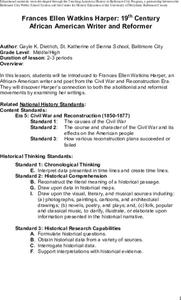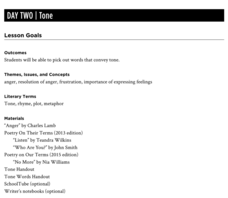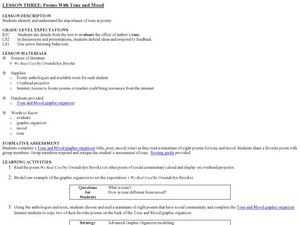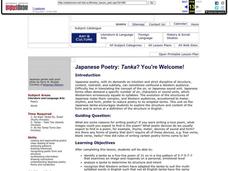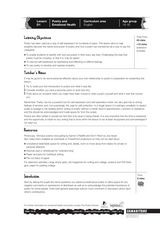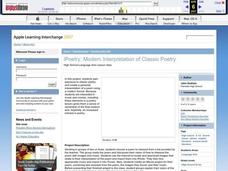Center for History Education
Frances Ellen Watkins Harper: 19th Century African-American Writer and Reformer
Although some African American abolitionists—such as Sojourner Truth and Frederick Douglass—are well known, others, like Frances Ellen Watkins Harper, remain in the shadows of history. Harper was a poet and activist who played an...
K20 LEARN
Whose Manifest Destiny? Westward Expansion
Your land is my land! Young historians investigate the concept of Manifest Destiny used by the United States government to justify western expansion. Jigsaw groups read primary source documents to gain an understanding of the movement...
K20 LEARN
Memory Haiku: The Great Gatsby and the Sense of Smell
Scholars learn how smells evoke early childhood memories and apply that knowledge to a character from F. Scott Fitzgerald's The Great Gatsby. After finding a passage from the novel that references smells, they craft a haiku and a...
Curated OER
Tone
Identifying the tone in a piece of writing can be tricky. Readers don't have the advantage of studying the images and colors used in a painting or the instruments and sounds of a song. The second lesson in this poetry unit teaches tweens...
Curated OER
Poetic Devices
Introduce middle schoolers to poetic devices with a lesson that asks them to find examples of alliteration, anaphora, onomatopoeia, metaphors, similes, and personification in various poems. Young scholars craft examples of these poetic...
EngageNY
Reading about Freaky Frogs: “The Glass Frog”
Freaky frogs are the focus of a lesson plan designed to boost reading comprehension skills using text features and asking and answering questions. Informational text and a poem supply scholars with animal-related vocabulary and facts. A...
EngageNY
Analyzing the Significance of the Novel’s Title: Connecting the Universal Refugee Experience to Inside Out and Back Again, Part 3
What does it mean to mourn something? Scholars continue reading paragraph four from "Refugee and Immigrant Children: A Comparison" to better understand the mourning process for refugee children. Working with a partner, pupils then read...
K20 LEARN
But What About Me?: Teaching Perspective In The Social Studies Classroom
How would the story of the discovery of America be different if indigenous people told it through their eyes? Individuals compare the conventional account of this moment in history to an account given by one of the native peoples. After...
Education Foundation of Sarasota County
Self-Calming Strategies to Manage Emotions
Tweens and teens learn coping skills to help manage strong emotions such as anger, fear, and sadness with a lesson that asks them to generate a list of self-calming strategies they use and to consider the suggestions in a short video and...
Curated OER
Abigail in Childbirth
Childbirth has never been easy and is not without risk, even in the 21st century. Young historians gain insight into the travails of 18th-century childbirth as they read letters between Abigail Adams and her husband about their loss of a...
Curated OER
Narrative Poetry
Sixth graders explore narrative poetry. In this language arts lesson, 6th graders create a group story. Students discuss the characteristics of narrative poetry and use a story elements checklist to determine which poems are narrative...
Curated OER
Poems with Tone and Mood
Learners examine the use of tone in poetry. In this literature lesson, students read "We Real Cool," by Gwendolyn Brooks and use the provided graphic organizer to chart the poem's tone and mood.
Curated OER
Review Steps in the Writing Process and Explore a Poem
Students practice their persuasive writing skills. For this writing process lesson, students write essays that meet the requirements of the included text element worksheets and analyze poetry of their choosing.
Curated OER
Japanese Poetry: Tanka? You're Welcome!
Students explore the structure and content of the Tanka form and to arrive at a definition of the structure in English. They analyze a tanka to determine its structure and intent and compose two Tanka; one in traditional form and one...
Curated OER
Poetry in Motion
Young scholars choose a poetry theme. They write a poem, illustrate it with digital images and record it using a digital video camera.
Curated OER
Poetry and Emotional Health
Young scholars explore self-expression through poetry. In this personal health lessons students read and discuss poetry regarding teen topics of interest. Young scholars write poems, that express empathy.
Curated OER
Poetry Cubes
Middle schoolers develop an appreciation for different styles of poetry and learn different techniques for memorization.
Curated OER
Poetry Reading for ELL Beginners
Bring the imagery of the desert to your classroom with this ELL lesson plan. After reading Madeleine Dunphy’s Here in the Southwestern Desert, learners complete a graphic organizer about the features and images of the poem. The...
Curated OER
iPoetry: Modern Interpretation of Classic Poetry
Students interpret a piece of poetry with images and music in a movie project.
Curated OER
Enhancing Poetry with American Memories
Pupils explore poetry using American Life Histories: Manuscripts from the Federal Writers' Project. They compose their own unque "found poetry" based on the stories found in the collection.
Curated OER
Poetry and Nature
Students observe an object in nature and record them. In groups, they create a group poem about the same object. They create their own poem based on another object using other their senses to help them. They share their poems with the...
Curated OER
Prairie Poetry
Ninth graders take note of the ways in which word choice, rhythm, language and narrative voice, as well as point of view in a poem can be used to evoke a time and place. They use their insights to create a poem of their own.
Curated OER
Creature Feature Poetry Keyword Search!
Young scholars examine the differences between fact and opinion, and brainstorm ideas for a keyword list by analyzing facts. They listen to poems, and create posters listing three keywords about each creature featured in the poetry.
Curated OER
Understanding Poetry
Students search the Internet to find a poem to research, analyze and present their interpretation of the poem to the class. They develop their interpretation in Microsoft Word and PowerPoint.
Other popular searches
- Poetry Analysis
- Poetry Alliteration Examples
- Poetry Alliteration
- Writing Poetry
- Concrete Poetry
- Poetry Unit
- Introduction to Poetry
- Poetry Lesson Plans
- African American Poetry
- Figurative Language Poetry
- Free Verse Poetry
- 6th Grade Poetry Unit


